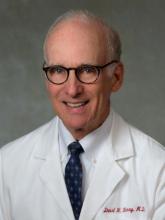Episode 24:
David H. Henry, MD, host of Blood & Cancer, is on location at the 2019 annual meeting of the American Society of Clinical Oncology in this podcast. Dr. Henry speaks with one of his own residents, Ronak Mistry, DO, about recent research among “bloodless medicine” patients, iron deficiency, and the ASCO experience.
Plus, in Clinical Correlation, Ilana Yurkiewicz, MD, of Stanford (Calif.) University, talks about what happens when patients do their own literature search for treatment options.
Show notes
By Emily Bryer, DO, resident in the department of internal medicine, University of Pennsylvania, Philadelphia
- “Bloodless medicine” patients demonstrated superior outcomes following cardiovascular surgery when their hemoglobin was optimized to a higher level.
- Iron deficiency is defined as transferrin saturation less than 20 with concurrent ferritin 100-300 or ferritin less than 100.
- Intravenous iron repletion is superior to oral iron repletion among patients with heart failure.
- Iron repletion in heart failure correlates with improved functional status.
- Iron deficiency anemia in heart failure goes underrecognized and undertreated.
Additional reading
Iron supplementation, response in iron-deficiency anemia: Analysis of five trials. Am J Med. 2017 Aug;130(8):991.e1-991.e8.
Risk-adjusted clinical outcomes in patients enrolled in a bloodless program. Transfusion. 2014 Oct;54(10 Pt 2):2668-77.
For more MDedge Podcasts, go to mdedge.com/podcasts
Email the show: podcasts@mdedge.com
Interact with us on Twitter: @MDedgehemonc
David Henry, MD on Twitter: @davidhenrymd
Ilana Yurkiewicz on Twitter: @ilanayurkiewicz

